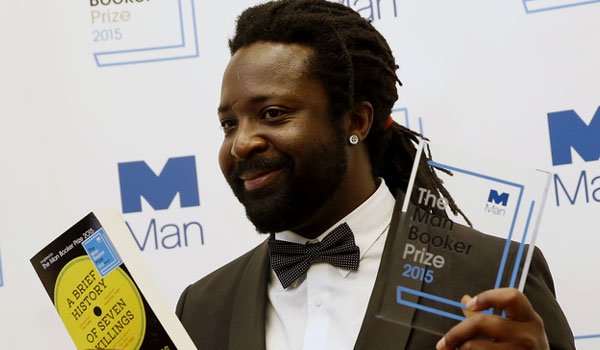The author told BBC Radio 4’s Today programme he had not slept since A Brief History of Seven Killings was announced as the winner of the £50,000 prize at a black-tie dinner at Guildhall in London on Tuesday night.
He recalled that his first novel, John Crow’s Devil, was rejected 78 times by publishers, before it was eventually published in 2005. “I had to sit down and add it up one day and I had no idea it was that much,” he said.
Despite the success of his latest novel, which the Man booker judges described as “an extraordinary book” after a unanimous decision, James said he thought the publishing industry had not changed that much since his first book was repeatedly turned down.
“There was a time I actually thought I was writing the kind of stories people didn’t want to read,” he told Today. Asked if he had considered giving up writing, the 44-year-old writer said: “I did give it up. I actually destroyed the manuscript, I even went on my friends computers and erased it.” He said he retrieved the text by searching in the email outbox of an old iMac computer.
James is the first Jamaican writer to win the Man Booker prize, taking the award for an uncompromising fictional history of the attempted murder of Bob Marley in 1976.
The chair of the judges, Michael Wood, admitted that his mother would “not have got beyond the first few pages because of the swearing” in the book.
Asked about the “bad” language in the book, James said: “Bad is relative. I’m writing about a lot of violent, not good people and I think the story called for it.”
He described his approach to the book as “educated guess” work about Jamaica’s history. He said: “A lot of it is based on true events, but quite a bit is made up and that’s part of the reason for the book itself, because there is no history.”
James was asked how he could write about the island while based in Minneapolis. He said: “I had to have the distance of a journalist. My editor is a non-fiction editor, funnily enough, and I wanted a non-fiction editor because I knew to a huge extent I was being a reporter for events that I don’t really know about. I think it called for that kind of impartiality and distance.”
Accepting the award from the Duchess of Cambridge, James said: “I just met Ben Okri [who won for The Famished Road in 1991] and it just reminded me of how much of my literary sensibilities were shaped by the Man Booker prize … it suddenly increases your library by 13 books.”
He dedicated his win to his late father with whom, he recalled, he used to have Shakespeare duels as a boy. “Who can have the longest soliloquy … just imagine a father and son in a Jamaican rum bar.”
The bookmakers’ favourite this year had been the US writer Hanya Yanagihara for A Little Life. The other books on the shortlist were Tom McCarthy’s Satin Island; Sunjeev Sahota’s The Year of the Runaways; Chigozie Obioma’s The Fishermen; and Anne Tyler’s A Spool of Blue Thread.
Wood’s fellow judges this year were author Frances Osborne, wife of the chancellor, George; poet and novelist John Burnside; journalist Sam Leith; and critic and broadcaster Ellah Wakatama Allfrey.
-The Guardian






